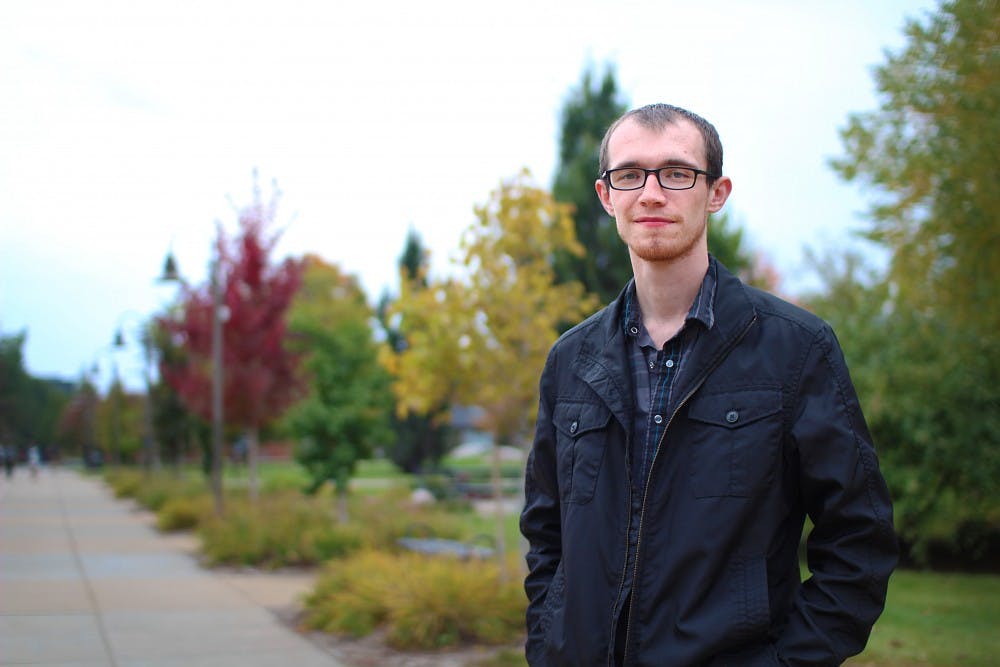Coming out lets students embrace identity

When Stephanie Mince started college, she wanted to be herself from the beginning.
The freshman, who came out about a month ago, said Central Michigan University seemed like a more accepting environment than her high school because there are people from a variety of backgrounds.

When someone comes out as a member of the LGBTQ+ community, it is usually a huge milestone in their life. Some people see college as a safe place to come out due to the open minded-ness of the environment.
This was true for Mince. In high school, she waited years to come out to her friends, and then found it was easier to be around them once she was out.
“I figured if I was just out from the start in college, I can just be that person I am the whole time and not have to wait,” Mince said. “It feels good knowing that if someone does ask, I can just be myself and not have to think about what I say so much.”
At CMU, Mince said she has people she can talk to who will understand how she feels. She has gone to every Spectrum meeting since the first one of the semester and has visited the Office of LGBTQ Services, which puts on programming and events and offers support to students.
Shannon Dettore, director of the Office of LGBTQ Services, said the office is open to everyone.
“I think we’re really just a support system to anyone who finds our office to be a safe home environment for them,” she said.
Dettore said CMU can be an accepting environment, but it depends on the individual student’s experiences.
“I think it’s all about the environment in which you’re going into, so there are some students who would say, ‘absolutely, this feels like a great, safe environment for me,’ and there would be students who would not feel that way,” she said.
Sparta junior Damien Powell, who started attending CMU this semester, said the community seems generally to be inclusive, but he’s still heard dialogue in classes that made it clear some people are not accepting of the LGBTQ+ community.
Powell was 22 and living at the Little Rock Air Force Base when he came out as gay four years ago. He called his mom first and cried, but she was understanding. He then posted on Facebook and for the most part, everyone seemed OK about it except two people who blocked him. One of his friends from the Air Force insisted Powell was just kidding, then stopped talking to him once he realized Powell was being serious.
This summer, Powell met up with his friend again, who now says he accepts Powell, “just not the whole marriage thing.” Powell received similar responses from some family members too, who said they support him, but think children should have a mother.
“It was kind of nice to go see him, learning that people do change,” Powell said. “Hopefully he can come to fully accept everything about the LGBTQ+ community.”
He said many people don’t understand how difficult it is to come out, and the inequalities that still exist and the personal struggles in people’s everyday lives.
“Coming out isn’t just this end process, it’s not just like, ‘Hey, I’m gay,’ so every time you go somewhere, it’s a new coming out process,” Powell said.
Not many people at CMU know Powell is gay.
The more accepting the environment is, he said, the more likely it is that people will come out.
If Powell had gone to a more supportive high school, it might have made him feel more comfortable to come out a younger age, he said.
Powell said forums and events are helpful for raising awareness and making people feel welcome, but he doesn't believe those always reach everyone. Personal dialogue has a big impact, he said, and people need to start that dialogue to let people know they’re accepted for who they are and welcome here.
Dettore said engaging with people who might identify differently than you is a good way to gain awareness.
“We know that when you make a personal connection with someone, you open your mind to what their story is and what their experience is, so we just overall encourage folks to embrace each other and learn about what each other’s experiences are,” Dettore said.
She said the Office of LGBTQ+ Services is often full of students, so they can talk with each other because they know it’s a safe environment. Not everyone has that atmosphere at home or in their living environment, she said, so it’s important that she creates that and helps students feel supported.
Mince said most people who don’t identify with the LGBTQ+ community seem to be aware of LGBTQ+ issues on a very general scale.
Many people have an understanding of marriage equality, Dettore said, but they’re not aware of the everyday interactions and microaggressions that affect the LGBTQ+ community.
“If that means not holding your partner’s hand because you’re nervous about what the response to that could be, or if that means not going to the bathroom because you don’t have access to a gender-neutral restroom, I don’t think people who don’t have to think about those things are aware that it’s even an issue, and that’s privilege,” Dettore said.
Powell thinks CMU has accepting leadership and a good focus on diversity.
He first heard people share their preferred pronouns at a Spectrum meeting, and likes how some faculty members include their preferred pronouns in their email signatures.
"The main thing is to try to let people know they can and should be themselves," Powell said.



